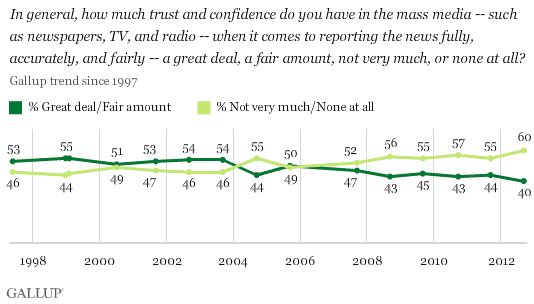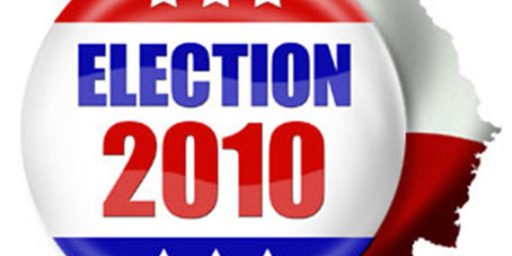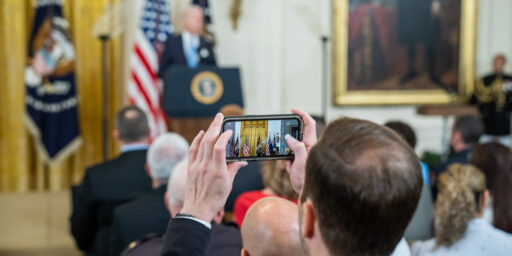Americans’ Distrust In Media Hits New High
Public distrust of the media is at an all-time high. It's easy to see why.
According to a new Gallup poll, the American public distrusts the media more now than it has since they’ve began polling the question in 1998:
WASHINGTON, D.C. — Americans’ distrust in the media hit a new high this year, with 60% saying they have little or no trust in the mass media to report the news fully, accurately, and fairly. Distrust is up from the past few years, when Americans were already more negative about the media than they had been in years prior to 2004.
The record distrust in the media, based on a survey conducted Sept. 6-9, 2012, also means that negativity toward the media is at an all-time high for a presidential election year. This reflects the continuation of a pattern in which negativity increases every election year compared with the year prior. The current gap between negative and positive views — 20 percentage points — is by far the highest Gallup has recorded since it began regularly asking the question in the 1990s. Trust in the media was much higher, and more positive than negative, in the years prior to 2004 — as high as 72% when Gallup asked this question three times in the 1970s.
The record distrust in the media, based on a survey conducted Sept. 6-9, 2012, also means that negativity toward the media is at an all-time high for a presidential election year. This reflects the continuation of a pattern in which negativity increases every election year compared with the year prior. The current gap between negative and positive views — 20 percentage points — is by far the highest Gallup has recorded since it began regularly asking the question in the 1990s. Trust in the media was much higher, and more positive than negative, in the years prior to 2004 — as high as 72% when Gallup asked this question three times in the 1970s.
This year’s decline in media trust is driven by independents and Republicans. The 31% and 26%, respectively, who express a great deal or fair amount of trust are record lows and are down significantly from last year. Republicans’ level of trust this year is similar to what they expressed in the fall of 2008, implying that they are especially critical of election coverage.
Independents are sharply more negative compared with 2008, suggesting the group that is most closely divided between President Barack Obama and Republican Mitt Romney is quite dissatisfied with its ability to get fair and accurate news coverage of this election.
More broadly, Republicans continue to express the least trust in the media, while Democrats express the most. Independents’ trust fell below the majority level in 2004 and has continued to steadily decline.
Here’s the chart:
It’s not at all surprising that public trust in media has declined over the years. For one thing, it’s consistent with other Gallup polling we’ve seen in recent years that shows that a whole host of public institutions, political and non-political, which really started declining around the time of the Watergate scandal, has been declining precipitously. Indeed, according to the most recent such poll from Gallup, the only institution that receives a very high amount of trust from the public is the military, which is on itself given that the military is far more detached from the general public today than it was in the early 1970s when the draft was in effect. Given the trends for public institutions as a whole, then, it’s not all surprising that the news media has seen a fall from grace in the eyes of the public.
There are also, I would argue, other reasons that the media isn’t as trusted as it was in the days when Walter Cronkite would declare “That’s the way it is” as if a 22 minute newscast could possibly sum up what “it” is on a nightly basis. For one thing, there are more choices out there today than there were when we were basically stuck with three networks. In addition to the fact that one can easily choose not to watch the news at all given all the other entertainment options available, the extent to which news on cable has become so corrupted by ideology on both the left (MSNBC) and the right (Fox News Channel) makes it pretty easy to become cynical about the entire business of news to begin with. Add to that the fact that most of the major “news” coverage on the broadcast networks tends to focus on even important topics in the most banal and uninformative ways possible, and it’s easy to see why the reputation of the news business as a whole has declined in recent years.
Another factor that has likely contributed to the decline in the reputation of the news business in recent years are the revelations that have come out about what sometimes seems like an appalling lack of integrity by so-called “journalists. NBC’s Dateline made it’s infamous in the 1990s by faking tests to make it appear that cars were less safe than they actually are. Even major newspapers like The New York Times and The Washington Post have found themselves rocked by scandals ranging from plagiarism by journalists to outright fabrication of stories. Additionally, both sides of the political aisle continue to detect what they consider examples of media bias. Some of these claims of bias are unfair and overhyped, but just as many of them are spot-on recognition of the fact that many of the most watched and read journalists out there aren’t really journalists anymore, they’re reading press releases and taking points provided to them by politicians and interest groups.
Finally, the bizarre reality of our cable news networks, where more time is spent talking about what the news means rather than what the news is. You can see this most clearly in the coverage from all three cable networks (and much of the coverage on the broadcast networks) involves talking about who’s up or down in the polls, what’s going on inside various campaigns, or inane gaffes that the voters clearly don’t care about very much. When people turn on the political coverage and see talking heads talking about things that only resonate inside the Beltway, it’s not surprise that they turn away in disgust. Additionally, it strikes me that this entire model does harm to the reputation of journalism as a profession because the same people who are supposed to be reporting the facts are turning around and giving their opinions on those facts. There ought to be a brighter line between the two if journalists want people to start trusting them again.
There are many reasons to explain why the media isn’t trusted as much as it used to be, but the main reasons all revolve around one simple fact. The media has not earned the level of trust it once had, and that’s their fault.








Because of things like posting a story with a misleading/incorrect story about a fine, refusing to correct it, and refusing to even discuss it with people who point out the error?
Anjin,
Do you think I read every comment? The only one I saw was one with a link to a story purporting to refute the premise of the article. I read it, found it unpersuasive and moved on. That was last night.
In any event, I changed the post title. Since, of course, people only read post titles and not the substance of the article.
For one thing, there are more choices out there today than there were when we were basically stuck with three networks.
This also highlights why polls like this are so problematic. What are respondents thinking of when they are asked their opinion on “mass media–such as newspapers, TV, and radio?” Does your average Fox News viewer who distrusts the “MSM” think that Fox News is not part of it?
Back when there were three networks and one or two hometown newspapers, there was little question what people would think of if you asked them their opinions of the “mass media.” Nowadays, with the exception of newspapers, which have declined in number somewhat, the media are more numerous and niche-focused than they ever were. Asking for opinions about them as if they were an easily defined entity will not give you useful results.
i think it would be interesting to see how local news orginizations would stack up against the national news. While I assume that the locals would have more trust, the question would be how much more.
Personally the only news program I watch anymore is the local NBC station out of Des Moines. I turn it on in the morning mainly for background noise as I get ready for work but they still pull my interest more than anything else. In fact it’s probably the only time during the day that i actually turn on my TV anymore. Everything else I watch I get from online, either from Netflix or Amazon or through my Google Reader.
@Doug Mataconis:
Considering the number of times you show up in the comments, yeah. But by my count about 13 of the 30 comments to that article were about or referenced your mistake. So were you only reading every other comment and somehow magically skipping all the ones that were unfavorable to you?
My comment, one of of several on that post, was that your headline referred to the city fining Feibush, when in fact your own link that you yourself cited made no reference to, and had no evidence of, Feibush having been fined for having cleaned up the lot. Your explanation still doesn’t address how you came up with that headline out of seemingly thin air.
You changed the title, but with no indication that you had put a false/misleading title before. There’s no acknowledgment of your error.
When you start running the newsroom like a business, ratings are all that matter. Maybe running everything like a business isn’t such a great idea.
Fog,
The newsroom has always been a business.
I distrust the media because with 47 days to go they haven’t asked a very basic question: where are Mitt’s medical records?
Romney suffered terrible head injuries that left him in a coma in 1968. Brain trauma can have permanent effects that can get worse with age; some drugs, like anti-seizure meds, can impair cognitive function. Inexplicable things tumble from Romney’s mouth almost every time it is opened. He maintains a suspiciously light workload for a man behind in the polls; almost as if he is not up to the rigors of the campaign trail. In London, presumably jet-lagged, his gaffe count was off the chart. And the Romney family openly admits that he is prone to volcanic rages which Ann has to “manage”.
There are legitimate question as to whether or not he is fit to be president, but the media has been cowed into staying away from them by a bunch of loons who equate serious inquiries like this with Obama’s college transcripts.
@Doug Mataconis:
While this is entirely true, not all business models or pressures are the same.
The fact is the “Golden Age” of American journalism took place at a time when big 3 broadcast news was not as ratings and profit driven and Newspapers were printing money.
All that changed by the beginning of the 80’s (for a variety of complex reasons, few of them initially having much to do with the news). Since that time in both Broadcast and Printed News the economics and business models shifted. TV News was expected not just to pay for itself but bring in profits. And newspapers began to see the fall of ad sales which began to transform the papers (including editorial).
Today, broadcast news is about cultivation of an audience (hence the turn back to more traditional forms of partisan reporting). Newspapers are just trying to stay alive and maintain subscribers (and stop the free fall of ad rates). And in both cases, its a shrink your way to success mentality.
Which gets to the ultimate punchline — people treat the Cronkite era as the norm in terms of faith in media. It really was an aberration. From my understanding, our jaded view on news is far close to how Americans felt about it in the first third of the last century.
@Doug Mataconis:
When you want to – and as you have very often done, you read every comment and you participate in whichever thread you choose to.
You chose this path: when you play in one thread, people assume that you can and will play in any thread.
Oddly enough, when people have evidence that the story you posted about was bogus you either:
A. Dig in and refuse to admit the facts in question
B. Choose this thread to be one of those that you do not follow
Good God, man. Do you have no self-awareness?
@de stijl:
You missed his third option:
C. Put up a few more posts excoriating the Obama administration for refusing to admit when they got a story wrong, and complaining that people can’t trust what they read in media anymore.
Or, as Bill Clinton put it, it takes some brass to attack a guy for doing what you did.
Four cable networks. You can’t leave out our two most trusted news sources, Stewart and Colbert on Comedy Central.
I started losing faith in the media in the 1990s, but what really did it for me was the financial crisis. From the time of Lehman’s fall until the passage of Dodd-Frank and Obamacare, about the only TV I watched was C-SPAN. I may not have seen every single hearing in both houses of Congress, but I certainly came close (it helps to have insomnia).
I quickly learned what, if anything, would turn up on the evening news: pithy sound-bites from a representative or senator that I knew, from watching the entire hearing, had been planned in advance solely to get just the sort of network coverage said saying got. What was almost totally missing from any TV coverage was substance.
I learned a lot, esp. about the financial crisis, by following the hearings, listening to all the witnesses (on all sides). And I learned an enormous amount about the process of creating legislation and about the intelligence, or lack thereof, of elected officials*.
Had I relied on network TV, or even the many publications I subscribed to at the time, I would have picked up only about 1% of what I got from watching C-SPAN. There is something seriously wrong with a theoretically 24×7 “news” system that cannot manage to produce more than 15 minutes of substance.
Indeed, the pundit response to Clinton’s DNC speech typified what is wrong: “it was too long”. It was full of facts (which could have been fact-checked), it was interesting, but almost all that mattered to the chattering class was its length.
Local news is, if anything, even worse. There is practically no way for an ordinary citizen with a job, family and life to know what, for example, the city council is doing. Yes, our hearings are on a cable channel, but it’s not the sort of thing that gets publicized and, quite frankly, I’d rather read a good summary than sit through the entire hearing. Coverage of state matters is almost as cursory.
In short, it is very difficult to be an informed citizen because nobody in the media seems to think we are interested in anything other than gossip, opinions, crime, traffic, weather and disasters.
*I just heard this morning that Waters will be replacing Frank as Ranking Member on the House Financial Services Committe which means it will be lead, on both sides of the aisle, by two of the dimmest bulbs (Bachus for Repubs.) in the House although Waters, at least, is not bought and paid for by the financial industry. Ugh.
THIS.
I don’t watch TV news for this very reason. I couldn’t stomach it 15 years ago, let alone today.
And yet, many quote them unquestioningly, this site included. That lack of trust is fungible.
Distrust may be up but someone is watching the news.
http://www.adweek.com/news/television/broadcast-news-rebounds-2011-137343
As far as what’s left of print media is concerned I think this may still apply to the hometown rag’s webpage:
And it really still comes down to this:
We got the bubble-headed-bleach-blonde who
Comes on at five
She can tell you ’bout the plane crash with a gleam
In her eye
It’s interesting when people die-
Give us dirty laundry
http://www.lyricsfreak.com/d/don+henley/dirty+laundry_20042033.html
maybe because we used to be able to “kinda trust the 5th estate” ?- now that they’re up against the wall financially they really need to appeal to consumers/advertisers. the big 3 are losing badly to cable news and print is a disaster so they’re picking their audience and catering their “news” to appeal to them. most of us can read between the lines of a headline and see where they’re headed and who they’re appealing to- the rest just read a headline and don’t bother with the story let alone pick apart the facts/factoids- it’s just something to talk about at the water cooler.
Generally, people no longer believe in an objective reality. It’s a cafeteria world out there – people trust the news on the basis of the source. Everyone goes to their own corner.
I stopped watching the national news a long time ago – my choice was a matter of convenience, not for reasons of “trust.” Cable news like Bloomberg cycle the news 24/7 – the national news does not.
The Sunday morning talkies are often excruciatingly hard to watch because the so-called mainstream media journalists and moderators are so intimidated by the conservative complaint that the media is biased that they equivocate everything and let false claims and misrepresentations go unanswered. Conservatives have emasculated the mainstream media.